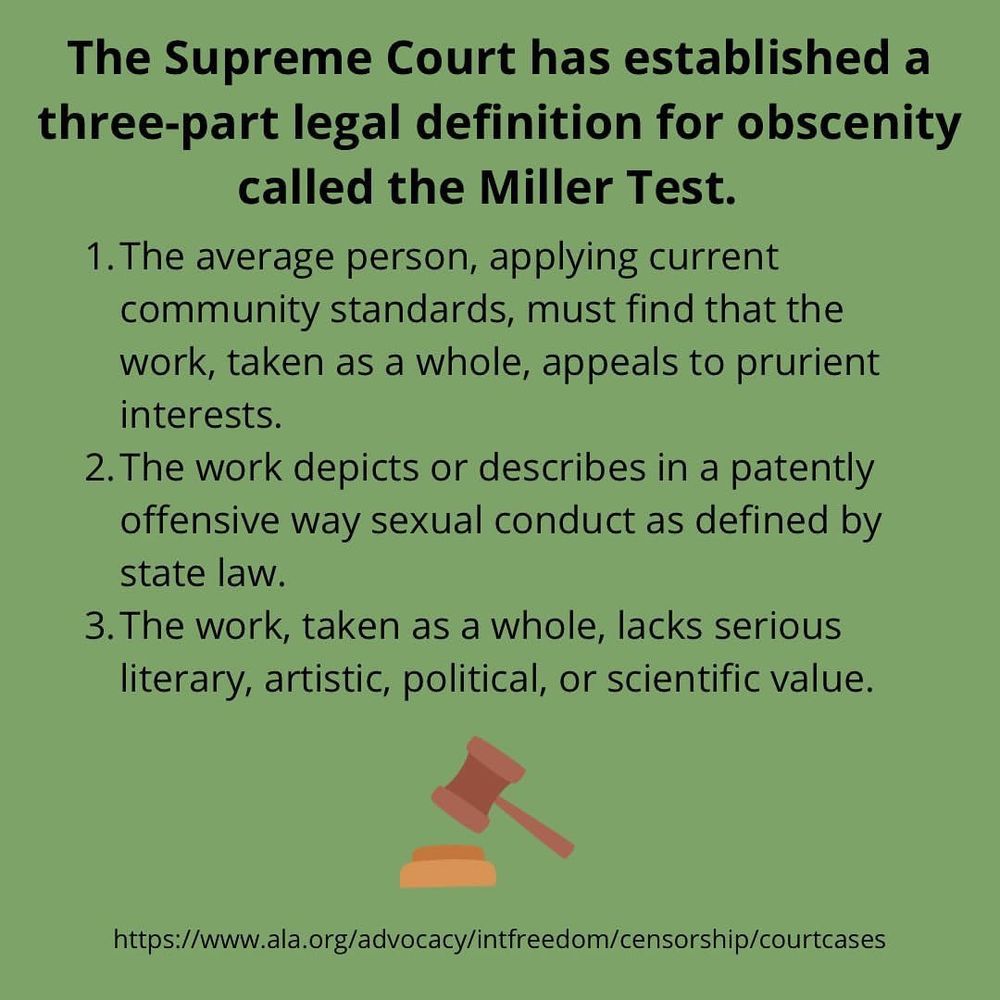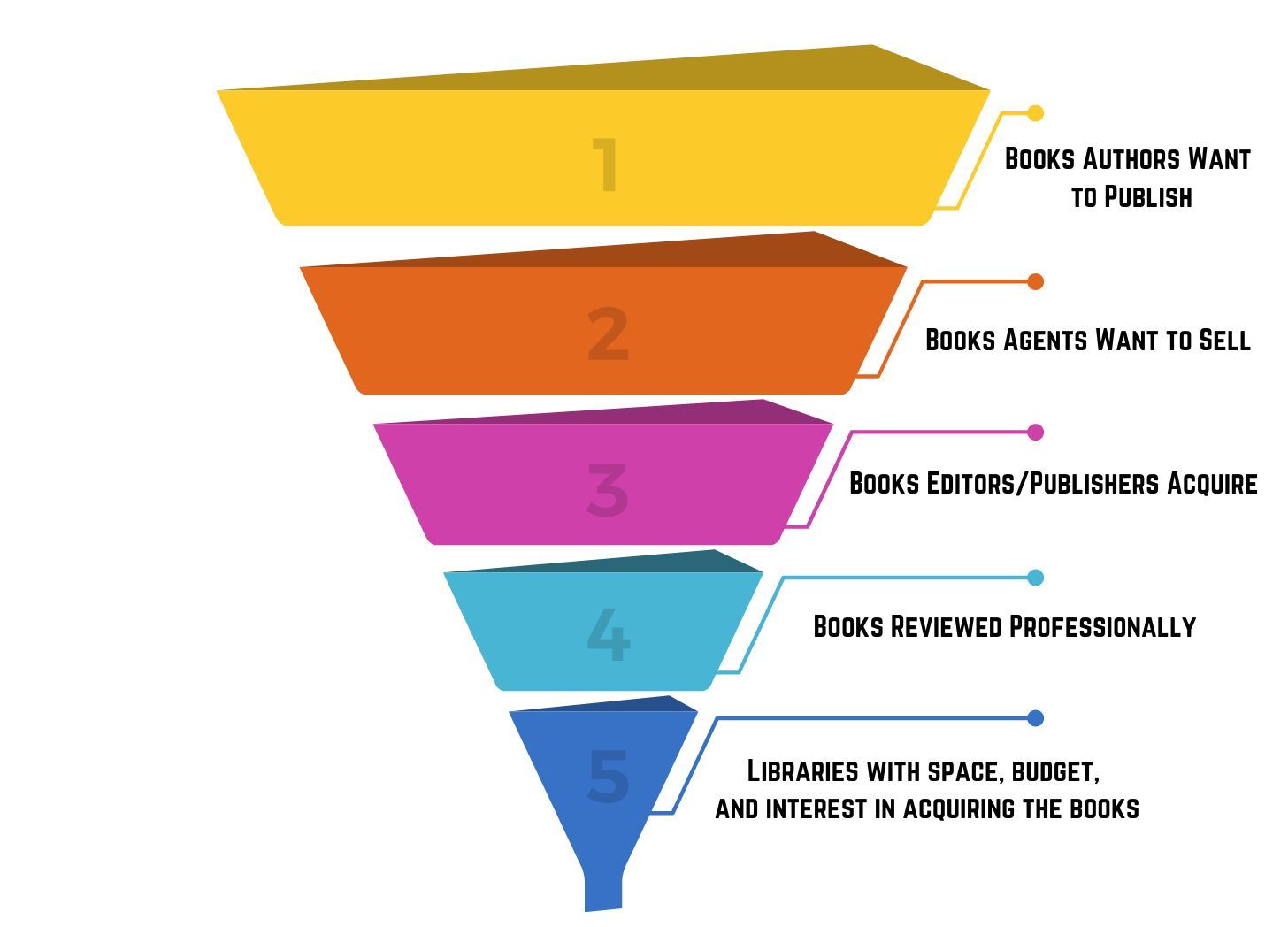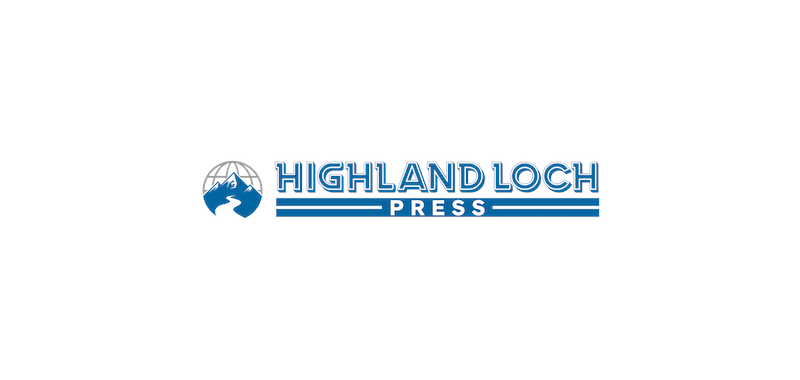Books don’t simply end up on library shelves. They go through upwards of a dozen or more checks before they ever make their way into the public or school library collection. Guardrails are part of the process from start to finish.
Among book banners is a common claim that anyone can publish anything and get it in the library. This is patently false and undermines not only the professional skills of library workers, but everyone from the author to their agent to their editor to the review journal editors and reviewers themselves. Just like no doctor tries every medicine they prescribe for their patients, it is untenable for any library worker to read every book put on shelves–and the distinction here is kind of key, given that prescribing medication is just that, prescriptive. Library shelves are open and accessible but not required reading. Like a doctor, though, library workers who select material for purchase rely on the work of other professionals to do their job to the best of their abilities. Those are called colleagues, professional review journals, and community input.
But before we even get to the library, all books published in the traditional route go through several processes before they’re even available for purchase. Authors seek representation from an agent, who is an expert on the kinds of books that are currently selling in the market. Agents are picky about the titles they represent, so only a fraction of a fraction of authors looking for representation will get that from an agent. Agencies may have some requirements or parameters on the kinds of works they will represent, too, meaning that the pool of possible books is even smaller.
If an agent decides to represent a book, they then need to seek out editors interested in acquiring said book. Those editors have budgets from their publisher, and while some publishers give their editors significant latitude for what they can acquire personally, others choose what titles to acquire through a committee. Though the numbers are typically much larger than this, let’s take these as an example. There are 100 books queried to an agent. That agent chooses to represent 10 of them; that’s 10% of the books. Now when the agent goes to sell those 10 books to an editor, two editors bite for one book each. That gets us to two of the 100 possible books going through the publishing side of the process or 1/50th of the books.
Let’s say hypothetically that an agent sold an editor an obscene book. First, that reflects on the agent and editor’s inability to understand what the obscenity law is; but more realistically, it simply would not happen because the number of books acquired by agents and then editors is already minuscule and extremely curated. Books cannot contain obscenity because it is against the law. Obscenity has a standard, court-issued definition, by which agents and publishers (as well as their legal teams!) must abide. It’s the three-prong, 60-some-word Miller Test. Even if one of those two books in our hypothetical situation were obscene, the legal department of the publisher would catch this before it ever went to press.

But there are not obscene books being acquired and published through traditional routes, and it’s rare to find them in self-published material…because it is against the law to publish or distribute such material. The obscenity arguments dramatically performed in board rooms would be better suited to thinking about what kind of obscene material is readily accessible on any teenager’s internet-capable phone.
The two editor-acquired books are now published. While library workers might learn about the titles via publisher preview events or publisher catalogs, most libraries require that every book purchased for the collection have at least one, if not several, positive trade reviews. These come through review journals, such as Kirkus, Publishers Weekly, School Library Journal, Library Journal, and so forth. These journals assign books to other professionals in and adjacent to the library field, who then read the book in its entirety and assess its merit for library collections. Sometimes it’s thumbs up and the reviewer believes it is a good fit for any library collection; sometimes, the reviewer will make suggestions for specific cases where the book would be a good addition (such as “junior high libraries where comics like Bone are popular”); still other times, the reviewer has reservations about the book and will not recommend it. Because multiple opinions help give a truer sense of a book’s content and appeal, library workers will read across several journals, as each journal has a particular set of parameters of how reviewers approach their work.
If you’re counting, it’s likely you have already lost how many guardrails are already in place and we haven’t even gotten to the library shelf yet.
Not all published books get reviewed in trade journals. There are so many reasons for this, including a lack of time or space, not receiving the material from the publisher, the book itself not being a good fit for the review journal’s audience (a book from an academic press that has an audience of adult academics in mind would not be a good fit for School Library Journal, which focuses on books for school-age readers).
In our hypothetical situation, let’s imagine both of the books published were reviewed in a review journal. Library workers are constrained by several things when it comes to the materials they acquire. First, is there a need in the collection for it and/or is there interest from the community in such material? If yes, then they consider the options available on the theme or topic. Budgets will determine how much or which titles are then selected; it is possible that sometimes, there will be acquisitions of several titles on a theme or in a category at a time due to holes or the recognition by library workers that it needs more materials (this happens especially with weeding—if librarians weed books in a particular content area because they’re out of date or no longer factually accurate, they’ll work to rebuild that). In the hypothetical, imagine one of the two published titles was acquired by a library. Now we’re at a whopping 1% of all the books in the imaginary scenario making it through all of the gates and past all the guardrails in place.
Here’s a visualization:


As for self-published books, if they’re not being reviewed in trade catalogs, if there are not community requests for them, or if they’re not by or about local people and interests, they will typically never make it to a library, period. In the exception cases, library workers will seek out whatever information they can to make a decision and/or read it for themselves. Discoverability of self-published material is nearly impossible without any of these factors and as noted in the traditionally published scenario, it’s those review journals and publisher previews that contribute to library workers even learning about what’s being released.
The idea that anyone can publish a book and get it on shelves in the library is absurd, unrealistic, and damning of several professions all at once. Though the systems are imperfect and mistakes happen, they aren’t mistakes of an illegal nature–they’re mistakes of buying a title that may later be discovered to have been plagiarized or contain outdated information. The rampant mis/dis/mal information about libraries and the materials in them coming from a small set of voices does not bestow those individuals any authority, experience, or knowledge of how to do the work of those trained professionals. Instead, they subvert the reality of the situation: it’s their job to actually parent their children and not expect the library to do it for them.
And, as always, we know this is not about materials in the public or school libraries. It’s about control, removal, and erasure of any and all materials outside of a singular white supremacist view of the world. See the latest attempts to get books pulled even in Little Free Libraries–the lies compound and the goalposts of the movement continue to move.
Book Censorship News: October 11, 2024
Danika and Erica did a fantastic job covering in my time away. I’m going to try to capture some of the stories that didn’t get linked in the past week, in addition to those that emerged this week, so the list may be even longer than usual.
- Eagle Public Library (ID) held a closed-door meeting and banned 24 books from the collection.
- The Cullman County Public Library (AL) got rid of their entire young adult section because of worries they’d be targeted by the state library oversight folks. There is no longer a YA section in the county library. Read that again.
- A single parent caused an uproar over the inclusion of a single comic in a book fair at Prairie Hill School District (IL). It is, of course, a queer comic.
- The board of the Fluvanna County High School (VA) could not make a decision on the future of the final two books challenged in a batch of 13 and both the books, Dime and What Girls Are Made Of, will be read and reviewed by the full committee for a November decision.
- “Board member Todd LeCompte, his wife, his campaign treasurer and the wife of trustee Lucas Scanlon accounted for 52 of the 58 book reconsideration requests submitted during the 2022-23 school year, according to records obtained from the Houston-area district.” This is the Cy-Fair Independent School District (TX) and it should be zero surprise that this was coordinated.
- The Denton, Texas, mayor wanted to appoint a frequent book banner to the city’s library board. The city council vetoed the idea.
- A high school teacher in the Higley Unified school (AZ) is being investigated by police relating to a parental complaint over a book.
- A parent in Watertown, New York, is mad about her 8th grader having to read The Hate U Give as part of a classroom assignment not because it covers discrimination but because it’s mortifying that it talks about sex and uses profanity.
- White Mountains Regional High School (NH) pulled a book from its English curriculum this year before the year began. It was The Absolutely True Diary of a Part-Time Indian, and there’s a bonus quote here about “not wanting to ban books” from the person who didn’t get the book pulled.
- “[Pasco County] public library system has pulled 130 books off its shelves after Commissioner Seth Weightman called for an audit of titles that he said have “disturbing” content. The list includes “And Tango Makes Three,” which publishers have sued to get returned to Florida school districts, “Beloved” by Toni Morrison and “The Perks of Being a Wallflower” by Stephen Chbosky.” The use of suppression here does a lot of work, doesn’t it? It’s a ban.
- Garrett-Keyser-Butler school board (IN) had banned the use of The Handmaid’s Tale in a 12th grade class but it was reinstated at the last board meeting. The book was used in an advanced placement class.
- Cobb County School District’s (GA) superintendent, Chris Ragsdale, loves banning books in the district.
- Three parents in Florida, including Stephana Farrell of the Florida Freedom to Read Project, are suing Ron DeSantis’s administration over their freedom to respond to book bans being restricted. Lawsuits are the biggest way forward.
- North Attleboro School District (MA) has developed a new policy for who can complain about books in the district.
- “Rosalie Stewart, however, has just been hired as Penguin Random House’s senior public policy manager, a new position that will fight the recent explosion in book-banning campaigns at schools and public libraries. ” Again, legal action is going to be hugely important if we want to make forward progress.
- The emphasis on legal action is because it works. What’s happening is not legal. This came to fruition in Crawford County, Arkansas, where patrons who sued the library over book relocation won and the library must put books back where they belong.
- Meanwhile, North Shelby Public Library (AL) will be segregating LGBTQ+ books out of their children’s collections.
- While we’re talking about Penguin Random House, the lawsuit the publisher and several other parties filed against Iowa’s book ban bill is being revived.
- Charleston County Schools (SC) have started to work on how they will implement the state’s draconian law on books available in schools. THIS line is key: ““I do have grave concerns that this was created,” Board of Trustees Member Dr. Carol Tempel said. “This regulation was created by an unelected group, and that also has not been reviewed by the legislature.””
- I had the opportunity to speak on a PEN America panel in Dallas for Banned Books Week, and here’s a writeup of the event–and several others–held that week.
- “Fast forward to fall 2024. Those proposed rules that took years of discussion, research, public feedback and revisions are now codified in district policy. In a 4–2 vote, board trustees passed the district’s first library policy, colloquially known as the “Opt-In Policy,” in December 2023; in August, they OK’d a second policy, called the “Procurement Policy,” which prohibits librarians from adding any books containing “sexually explicit content” to their collections.” Nonsense afoot in the Laramie County Schools (WY) and several parents are unhappy with the board making up problems that don’t exist.
- Here’s a story of a young adult–not too far from high school graduation–fighting back against book bans in the Pennsylvania district she attended.
- Horry County, South Carolina, schools have pulled Assassination Classroom from shelves for review. This is a commonly challenged and banned manga. If you’ve read it, you know how absolutely absurd the challenge is, especially in a country where guns aren’t regulated.
- Alachua County School Board (FL) voted to keep nine books on shelves.
- New Jersey’s Freedom to Read Act will be moving on to review by the whole state Senate.
- “Conservative activists have taken up Benson’s cause, and a well-known pastor disrupted a county school board meeting Tuesday night to challenge the assignment.” The 15-year-old who was uncomfortable reading a short story that had a single section about sex between cousins was likely forced into this nonsense by these so-called “activists.” Interestingly, she likely didn’t have to read it since alternative assignments exist. Here’s that story and then the story of the pastor who loves banning books and who showed up to the Wake County (NC) school board meeting about this.
- St. Joseph School District (MO) will be keeping two more books in their school libraries: Tricks and 13 Reasons Why.
- Somerville Library (MA) had a bomb threat that disrupted Drag Queen Story Time.
- This is a fantastic piece on the state of comics censorship right now.
- 24 books that had been previously banned in Escambia County Schools (FL) are back on shelves.
- “The vociferously anti-LGBTQ superintendent of a Virginia public school district claims he was fired not for a lack of qualifications or his bigoted online activity, but for joining with former child star-turned-ultra-conservative evangelical activist Kirk Cameron in a campaign to sideline secular children’s titles by Scholastic, the world’s largest publisher of children’s books, in favor of Christian-themed books that “reinforce biblically-based, foundational values.”” Well what do you think would happen when you cancel a legitimate book fair to serve students and instead bring in Brave Books’s nonsense SkyTree Book Fair to shill their right-wing books at kids? This is Spotsylvania, Virginia, county schools.
- PEN America has released a new report on censorship in higher education.
- How a religious legal institution gained a foothold in several Pennsylvania school districts to craft policy in those districts.
- Alpena Public Library (MI), still dealing with the book crisis actors, is avoiding having their board fired by the city commissioners. Why? The 14 books that have been among the central complaints were moved from the youth section to a section about puberty. This story has been unbelievable, start to finish.
- Take a moment with this story about a new board member who was selected to fill a vacancy on the Conway School Board (AR). It showcases how absolutely cruel and inhumane these people are. (Now, too, that board has a direct connection to the governor’s office).
- In Montgomery County, Texas, where citizens get to review books they want to have removed from the public library (err, where they review books challenged in the public library), the policy is being reconsidered. Why? Wouldn’t you know that despite requiring people to live in the county where they want to ban books, they don’t actually check to see if they do.
- The Republican Party of Crawford County, Arkansas, put up billboards that claim voting republican will keep porn out of the libraries. A reminder: there is no porn in libraries.
- So now that Samuels Public Library (VA) has overcome near closure due to a tiny number of bigoted citizens, they face something else (despite their recent awarding of library of the year): public works has stopped servicing the facility.
If you’ve made it this far, I wanted to also drop a link to last week’s episode of On The Media, where I was a guest. Here’s what’s happening this many years on into the book ban surge.

